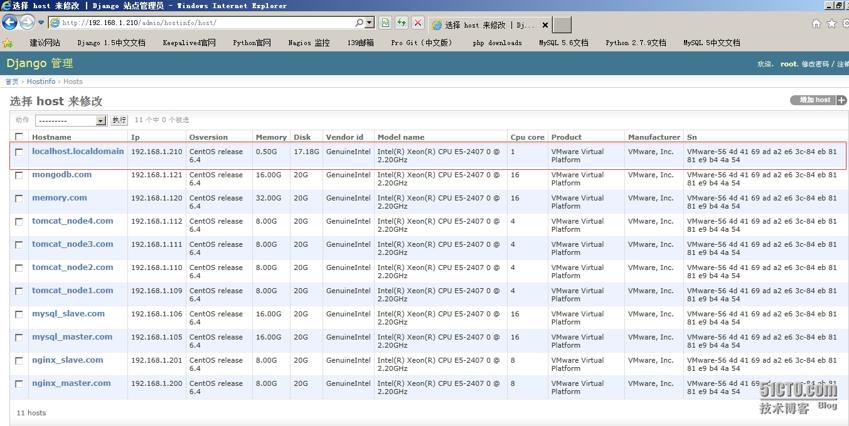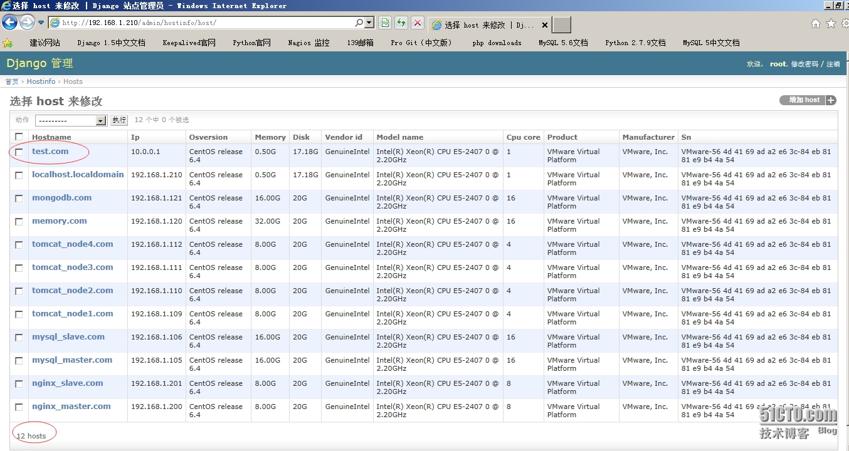Python [6] IT资产管理(下)
发布时间:2019-09-22 07:40:18编辑:auto阅读(2533)
上一篇博客聊到以下内容
1、安装django
2、部署工程和应用
3、修改、添加工程和应用配置文件并能成功url访问
4、Python脚本采集主机信息
5、通过post方式传送搜集的信息到服务器端
6、主机分组
如需更详细的了解,请参考http://467754239.blog.51cto.com/4878013/1616551
在这篇博客中,我们针对上篇博客中的重点部分做阐述,如何多钟方式实现第5步:
一、Python序列化
1、序列化是什么
序列化:内存里面有一个数据结构,你希望将它保存下来,重用,或者发送给其他人。你会怎么做?嗯, 这取决于你想要怎么保存,怎么重用,发送给谁。很多游戏允许你在退出的时候保存进度,然后你再次启动的时候回到上次退出的地方。(实际上, 很多非游戏程序也会这么干。) 在这个情况下, 一个捕获了当前进度的数据结构需要在你退出的时候保存到磁盘上,接着在你重新启动的时候从磁盘上加载进来。这个数据只会被创建它的程序使用,不会发送到网 络上,也不会被其它程序读取。因此,互操作的问题被限制在保证新版本的程序能够读取以前版本的程序创建的数据。
2、实现序列化的方法
pickle(python语言编写)、cPickle(c语言编写)
JSON
Shelve
YAML
3、pickle和JSON的基本使用
pickle
(1)pickle将字典序列化存储到文本文件中
[root@localhost test]# pwd
/tmp/test
[root@localhost test]# ls
1_pickle_dump.py 2_pickle_load.py
[root@localhost test]# python 1_pickle_dump.py
[root@localhost test]# ls
1_pickle_dump.py 2_pickle_load.py dump.txt #存储到磁盘的文件中
[root@localhost test]# cat dump.txt
(dp0
S'age'
p1
S'25'
p2
sS'tel'
p3
S'132600*****'
p4
sS'name'
p5
S'ZhengYanSheng'
p6
s.
[root@localhost test]# cat 1_pickle_dump.py
#!/usr/bin/env python
#
import pickle
d = {'name':'ZhengYanSheng','age':'25','tel':'132600*****'}
with open('/tmp/test/dump.txt','w') as fd:
pickle.dump(d,fd)
(2)pickle加载文本文件中的内容并生成一个新的字典
[root@localhost test]# pwd
/tmp/test
[root@localhost test]# ls
1_pickle_dump.py 2_pickle_load.py dump.txt
[root@localhost test]# python 2_pickle_load.py
{'age': '25', 'tel': '132600*****', 'name': 'ZhengYanSheng'} #生成一个新的字典
[root@localhost test]# cat 2_pickle_load.py
#!/usr/bin/env python
#
import pickle
with open('/tmp/test/dump.txt','r') as fd:
d1 = pickle.load(fd)
print d1json
这次我们直接在Ipython的交互式中进行操作json的使用
(1)json的导出
[root@localhost ~]# ipython
Python 2.6.6 (r266:84292, Feb 22 2013, 00:00:18)
Type "copyright", "credits" or "license" for more information.
IPython 1.2.1 -- An enhanced Interactive Python.
? -> Introduction and overview of IPython's features.
%quickref -> Quick reference.
help -> Python's own help system.
object? -> Details about 'object', use 'object??' for extra details.
In [1]: import json
In [2]: d = {'a':'a','b':235,'c':('c1','c2'),'d':'True','e':'None'}
In [3]: d
Out[3]: {'a': 'a', 'b': 235, 'c': ('c1', 'c2'), 'd': 'True', 'e': 'None'}
In [4]: with open('/tmp/test/d.json','w') as fd:
...: json.dump(d,fd) #写入到文件中
...:
Do you really want to exit ([y]/n)?
[root@localhost ~]# cat /tmp/test/d.json #在shell模式下查看写入的文件内容
{"a": "a", "c": ["c1", "c2"], "b": 235, "e": "None", "d": "True"}
(2)json的载入
[root@localhost ~]# ipython
Python 2.6.6 (r266:84292, Feb 22 2013, 00:00:18)
Type "copyright", "credits" or "license" for more information.
IPython 1.2.1 -- An enhanced Interactive Python.
? -> Introduction and overview of IPython's features.
%quickref -> Quick reference.
help -> Python's own help system.
object? -> Details about 'object', use 'object??' for extra details.
In [1]: import json
In [2]: with open('/tmp/test/d.json','r') as fd:
...: dd = json.load(fd)
In [3]: print dd
{u'a': u'a', u'c': [u'c1', u'c2'], u'b': 235, u'e': u'None', u'd': u'True'}二、多种以POST方式传参的列子
1、pickle的方式
(1)修改views.py文件
[root@localhost Simplecmdb]# cat hostinfo/views.py
from django.shortcuts import render
from django.http import HttpResponse
from hostinfo.models import Host
import pickle #导入pickle模块
# Create your views here.
def index(req):
if req.method == 'POST':
pick_obj = pickle.loads(req.body) #接受客户端的传参是一个字典
hostname = pick_obj['hostname'] #既然是一个字典,那么我们就一个变量变量的接收
ip = pick_obj['ip']
osversion = pick_obj['osversion']
memory = pick_obj['memory']
disk = pick_obj['disk']
vendor_id = pick_obj['vendor_id']
model_name = pick_obj['model_name']
cpu_core = pick_obj['cpu_core']
product = pick_obj['product']
Manufacturer = pick_obj['Manufacturer']
sn = pick_obj['sn']
try:
host = Host.objects.get(hostname=hostname)
except:
host = Host()
host.hostname = hostname
host.ip = ip
host.osversion = osversion
host.memory = memory
host.disk = disk
host.vendor_id = vendor_id
host.model_name = model_name
host.cpu_core = cpu_core
host.product = product
host.Manufacturer = Manufacturer
host.sn = sn
host.save()
return HttpResponse('ok')
else:
return HttpResponse('no data')(2)修改搜集主机信息脚本(需要修改一个地方)
[root@localhost Simplecmdb]# vim post_hostinfo.py
#!/usr/bin/env python
#coding:utf8
#author:Allentuns
#time:2015-02-14
from subprocess import Popen,PIPE
import urllib,urllib2
import pickle
import json
import re
###[hostname message]#####
def get_HostnameInfo(file):
with open(file,'r') as fd:
data = fd.read().split('\n')
for line in data:
if line.startswith('HOSTNAME'):
hostname = line.split('=')[1]
break
return hostname
#####[ipaddr message]#####
def get_Ipaddr():
P = Popen(['ifconfig'],stdout=PIPE)
data = P.stdout.read()
list = []
str = ''
option = False
lines = data.split('\n')
for line in lines:
if not line.startswith(' '):
list.append(str)
str = line
else:
str += line
while True:
if '' in list:
list.remove('')
else:
break
r_devname = re.compile('(eth\d*|lo)')
r_mac = re.compile('HWaddr\s([A-F0-9:]{17})')
r_ip = re.compile('addr:([\d.]{7,15})')
for line in list:
devname = r_devname.findall(line)
mac = r_mac.findall(line)
ip = r_ip.findall(line)
if mac:
return ip[0]
#####[osversion message]#####
def get_OsVerion(file):
with open(file) as fd:
lines = fd.readlines()
os_version = lines[0][:-8]
return os_version
#####[memory message]#####
def get_MemoryInfo(file):
with open(file) as fd:
data_list = fd.read().split('\n')
MemTotal_line = data_list[0]
Memory_K = MemTotal_line.split()[1]
Memory_G = float(Memory_K)/1000/1000
Memory_G2 = '%.2f' % Memory_G
memory = Memory_G2 + 'G'
return memory
#####[disk message]#####
def get_DiskInfo():
p = Popen(['fdisk','-l'],stdout=PIPE,stderr=PIPE)
stdout,stderr = p.communicate()
diskdata = stdout
disk_initial_size = 0
re_disk_type = re.compile(r'Disk /dev/[shd]{1}.*:\s+[\d.\s\w]*,\s+([\d]+).*')
disk_size_bytes = re_disk_type.findall(diskdata)
for size in disk_size_bytes:
disk_initial_size += int(size)
disk_size_total_bytes = '%.2f' % (float(disk_initial_size)/1000/1000/1000)
disk_size_total_G = disk_size_total_bytes + 'G'
disk = disk_size_total_G
return disk
#####[cpu message]#####
def get_CpuInfo():
p = Popen(['cat','/proc/cpuinfo'],stdout=PIPE,stderr=PIPE)
stdout, stderr = p.communicate()
cpudata = stdout.strip()
cpu_dict = {}
re_cpu_cores = re.compile(r'processor\s+:\s+([\d])')
re_vendor_id = re.compile(r'vendor_id\s+:\s([\w]+)')
re_model_name = re.compile(r'model name\s+:\s+(.*)')
res_cpu_cores = re_cpu_cores.findall(cpudata)
cpu_dict['Cpu_Cores'] = int(res_cpu_cores[-1]) + 1
res_vendor_id = re_vendor_id.findall(cpudata)
cpu_dict['Vendor_Id'] = res_vendor_id[-1]
res_model_name = re_model_name.findall(cpudata)
cpu_dict['Model_Name'] = res_model_name[-1]
return cpu_dict
#####[Demi message]#####
def get_dmidecode():
P = Popen(['dmidecode'],stdout=PIPE)
data = P.stdout.read()
lines = data.split('\n\n')
dmidecode_line = lines[2]
line = [i.strip() for i in dmidecode_line.split('\n') if i]
Manufacturer = line[2].split(': ')[-1]
product = line[3].split(': ')[-1]
sn = line[5].split(': ')[-1]
return Manufacturer,product,sn
if __name__ == '__main__':
#####[get data]#####
hostname = get_HostnameInfo('/etc/sysconfig/network')
ip = get_Ipaddr()
osversion = get_OsVerion('/etc/issue')
memory = get_MemoryInfo('/proc/meminfo')
disk = get_DiskInfo()
Vendor_Id = get_CpuInfo()['Vendor_Id']
Model_Name = get_CpuInfo()['Model_Name']
Cpu_Cores = get_CpuInfo()['Cpu_Cores']
Manufacturer,product,sn = get_dmidecode()
#####[get dict]#####
hostinfo = {
'hostname':hostname,
'ip':ip,
'osversion':osversion,
'memory':memory,
'disk':disk,
'vendor_id':Vendor_Id,
'model_name':Model_Name,
'cpu_core':Cpu_Cores,
'product':product,
'Manufacturer':Manufacturer,
'sn':sn,
}
print hostinfo
#data = urllib.urlencode(hostinfo) #注释掉原来
data = pickle.dumps(hostinfo) #添加一行
req = urllib2.urlopen('http://192.168.1.210:80/hostinfo',data)(3)执行此脚本
[root@localhost Simplecmdb]# python post_hostinfo.py
{'product': 'VMware Virtual Platform', 'ip': '192.168.1.210', 'vendor_id': 'GenuineIntel', 'cpu_core': 1, 'disk': '17.18G', 'hostname': 'localhost.localdomain', 'sn': 'VMware-56 4d 41 69 ad a2 e6 3c-84 eb 81 81 e9 b4 4a 54', 'memory': '0.50G', 'osversion': 'CentOS release 6.4 ', 'model_name': 'Intel(R) Xeon(R) CPU E5-2407 0 @ 2.20GHz', 'Manufacturer': 'VMware, Inc.'}(4)刷新浏览器,会看到新添加了一行
2、json方式(和上述方法基本相同)
(1)修改views.py文件
[root@localhost Simplecmdb]# cat hostinfo/views.py
from django.shortcuts import render
from django.http import HttpResponse
from hostinfo.models import Host
import pickle
import json #导入模块
# Create your views here.
def index(req):
if req.method == 'POST':
pick_obj = json.loads(req.body) #修改此处
hostname = pick_obj['hostname']
ip = pick_obj['ip']
osversion = pick_obj['osversion']
memory = pick_obj['memory']
disk = pick_obj['disk']
vendor_id = pick_obj['vendor_id']
model_name = pick_obj['model_name']
cpu_core = pick_obj['cpu_core']
product = pick_obj['product']
Manufacturer = pick_obj['Manufacturer']
sn = pick_obj['sn']
try:
host = Host.objects.get(hostname=hostname)
except:
host = Host()
host.hostname = hostname
host.ip = ip
host.osversion = osversion
host.memory = memory
host.disk = disk
host.vendor_id = vendor_id
host.model_name = model_name
host.cpu_core = cpu_core
host.product = product
host.Manufacturer = Manufacturer
host.sn = sn
host.save()
return HttpResponse('ok')
else:
return HttpResponse('no data')(2)修改搜集主机信息脚本(需要修改一个地方)
[root@localhost Simplecmdb]# cat post_hostinfo.py
#!/usr/bin/env python
#coding:utf8
#author:Allentuns
#time:2015-02-14
from subprocess import Popen,PIPE
import urllib,urllib2
import pickle
import json
import re
###[hostname message]#####
def get_HostnameInfo(file):
with open(file,'r') as fd:
data = fd.read().split('\n')
for line in data:
if line.startswith('HOSTNAME'):
hostname = line.split('=')[1]
break
return hostname
#####[ipaddr message]#####
def get_Ipaddr():
P = Popen(['ifconfig'],stdout=PIPE)
data = P.stdout.read()
list = []
str = ''
option = False
lines = data.split('\n')
for line in lines:
if not line.startswith(' '):
list.append(str)
str = line
else:
str += line
while True:
if '' in list:
list.remove('')
else:
break
r_devname = re.compile('(eth\d*|lo)')
r_mac = re.compile('HWaddr\s([A-F0-9:]{17})')
r_ip = re.compile('addr:([\d.]{7,15})')
for line in list:
devname = r_devname.findall(line)
mac = r_mac.findall(line)
ip = r_ip.findall(line)
if mac:
return ip[0]
#####[osversion message]#####
def get_OsVerion(file):
with open(file) as fd:
lines = fd.readlines()
os_version = lines[0][:-8]
return os_version
#####[memory message]#####
def get_MemoryInfo(file):
with open(file) as fd:
data_list = fd.read().split('\n')
MemTotal_line = data_list[0]
Memory_K = MemTotal_line.split()[1]
Memory_G = float(Memory_K)/1000/1000
Memory_G2 = '%.2f' % Memory_G
memory = Memory_G2 + 'G'
return memory
#####[disk message]#####
def get_DiskInfo():
p = Popen(['fdisk','-l'],stdout=PIPE,stderr=PIPE)
stdout,stderr = p.communicate()
diskdata = stdout
disk_initial_size = 0
re_disk_type = re.compile(r'Disk /dev/[shd]{1}.*:\s+[\d.\s\w]*,\s+([\d]+).*')
disk_size_bytes = re_disk_type.findall(diskdata)
for size in disk_size_bytes:
disk_initial_size += int(size)
disk_size_total_bytes = '%.2f' % (float(disk_initial_size)/1000/1000/1000)
disk_size_total_G = disk_size_total_bytes + 'G'
disk = disk_size_total_G
return disk
#####[cpu message]#####
def get_CpuInfo():
p = Popen(['cat','/proc/cpuinfo'],stdout=PIPE,stderr=PIPE)
stdout, stderr = p.communicate()
cpudata = stdout.strip()
cpu_dict = {}
re_cpu_cores = re.compile(r'processor\s+:\s+([\d])')
re_vendor_id = re.compile(r'vendor_id\s+:\s([\w]+)')
re_model_name = re.compile(r'model name\s+:\s+(.*)')
res_cpu_cores = re_cpu_cores.findall(cpudata)
cpu_dict['Cpu_Cores'] = int(res_cpu_cores[-1]) + 1
res_vendor_id = re_vendor_id.findall(cpudata)
cpu_dict['Vendor_Id'] = res_vendor_id[-1]
res_model_name = re_model_name.findall(cpudata)
cpu_dict['Model_Name'] = res_model_name[-1]
return cpu_dict
#####[Demi message]#####
def get_dmidecode():
P = Popen(['dmidecode'],stdout=PIPE)
data = P.stdout.read()
lines = data.split('\n\n')
dmidecode_line = lines[2]
line = [i.strip() for i in dmidecode_line.split('\n') if i]
Manufacturer = line[2].split(': ')[-1]
product = line[3].split(': ')[-1]
sn = line[5].split(': ')[-1]
return Manufacturer,product,sn
if __name__ == '__main__':
#####[get data]#####
hostname = get_HostnameInfo('/etc/sysconfig/network')
ip = get_Ipaddr()
osversion = get_OsVerion('/etc/issue')
memory = get_MemoryInfo('/proc/meminfo')
disk = get_DiskInfo()
Vendor_Id = get_CpuInfo()['Vendor_Id']
Model_Name = get_CpuInfo()['Model_Name']
Cpu_Cores = get_CpuInfo()['Cpu_Cores']
Manufacturer,product,sn = get_dmidecode()
#####[get dict]#####
hostinfo = {
'hostname':hostname,
'ip':ip,
'osversion':osversion,
'memory':memory,
'disk':disk,
'vendor_id':Vendor_Id,
'model_name':Model_Name,
'cpu_core':Cpu_Cores,
'product':product,
'Manufacturer':Manufacturer,
'sn':sn,
}
print hostinfo
#data = urllib.urlencode(hostinfo)
#data = pickle.dumps(hostinfo) #注释掉
data = json.dumps(hostinfo) #添加一行
req = urllib2.urlopen('http://192.168.1.210:80/hostinfo',data)(3)执行此脚本
[root@localhost Simplecmdb]# python post_hostinfo.py
{'product': 'VMware Virtual Platform', 'ip': '192.168.1.210', 'vendor_id': 'GenuineIntel', 'cpu_core': 1, 'disk': '17.18G', 'hostname': 'localhost.localdomain', 'sn': 'VMware-56 4d 41 69 ad a2 e6 3c-84 eb 81 81 e9 b4 4a 54', 'memory': '0.50G', 'osversion': 'CentOS release 6.4 ', 'model_name': 'Intel(R) Xeon(R) CPU E5-2407 0 @ 2.20GHz', 'Manufacturer': 'VMware, Inc.'}(4)刷新浏览器,会看到再次新添加了一行
上一篇: python while循环
下一篇: Winpe2.0 DIY(3)Aston
- openvpn linux客户端使用
52055
- H3C基本命令大全
51924
- openvpn windows客户端使用
42149
- H3C IRF原理及 配置
38994
- Python exit()函数
33494
- openvpn mac客户端使用
30446
- python全系列官方中文文档
29082
- python 获取网卡实时流量
24112
- 1.常用turtle功能函数
24018
- python 获取Linux和Windows硬件信息
22369
- LangChain1.0-Agent-部署/上线(开发人员必备)
120°
- LangChain1.0-Agent-Spider实战(爬虫函数替代API接口)
153°
- LangChain1.0-Agent(进阶)本地模型+Playwright实现网页自动化操作
166°
- LangChain1.0-Agent记忆管理
148°
- LangChain1.0-Agent接入自定义工具与React循环
175°
- LangChain1.0-Agent开发流程
161°
- LangChain1.0调用vllm本地部署qwen模型
182°
- LangChain-1.0入门实践-搭建流式响应的多轮问答机器人
188°
- LangChain-1.0入门实战-1
187°
- LangChain-1.0教程-(介绍,模型接入)
203°
- 姓名:Run
- 职业:谜
- 邮箱:383697894@qq.com
- 定位:上海 · 松江


